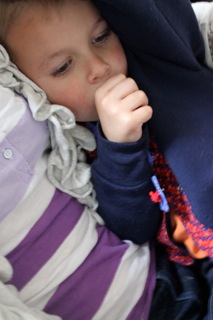 Our son, Kieran, has been struggling with a bout of the “I cannot’s” lately.
Our son, Kieran, has been struggling with a bout of the “I cannot’s” lately.
“I cannot take my shirt off, you do it mama.”
“I cannot ride my scooter! I cannot!”
“I cannot glue the ribbon on.”
Before teach a toddler to ride, I tried to isolate the problem:
Am I asking him to do too much? His “can’ts” are sometimes, but not always, in response to something I’ve asked him to do, so I don’t think they are the result of request overload or mere unwillingness. And they are usually in reference to a skill or activity that I know he can do, so they are not based on inability or even fear of failure.
Are the “can’ts” related to a mood or condition? I have not connected them to a time of day (i.e., when he is tired or hungry) or an emotional state (i.e., when he is upset). Nor do they appear to be a matter of disinterest.
Does he really think he can’t? The frequency of the phrase made me worry about his developing self-esteem. It is important to my husband and I to respond in a way that will acknowledge Kieran’s feelings as well as empower him, but we weren’t sure how to address the “can’ts.” After researching, reading, and soliciting the advice of some wise mama friends, I came up with the following list of ideas parents may use to respond to a case of the “can’ts.”
10 Ways Parents Can Respond Gently and Constructively When Children Say “I Can’t!”
1.Brainstorm Solutions: Rather than rushing to fix your child’s upset, engage him in the problem-solving process. Be attentive and validate your child’s emotions, and then empower your child to come up with his own solution. Trusting him to figure out conflict will help him develop lifelong coping skills and a healthy self-esteem.
“It looks like your blocks are having a hard time staying stacked up on this carpet, and I understand why you are frustrated when your blocks fall over. What do you think we could do so that you can enjoy building with your blocks?”
This idea is based on Naomi Aldort’s S.A.L.V.E. method, which you can read more about in her book, Raising Our Children, Raising Ourselves.
2. Help: And then there are the times that your child is feeling tired, hungry, or overwhelmed and just needs some assistance. Your simple offer to help may make things seem a little more bearable. Depending on the age of the child and her level of frustration, your offer to help may be specific or open-ended.
“I can see that you are getting frustrated dressing your doll. Would you like me to hold her for you while you dress her?” or
“I can see that you are getting frustrated dressing your doll. Would you like me to help you? What can I do to make it easier?”
3. Offer a Break: If your child has been working at a task for a long time, they might just need to step back from it for awhile. This is especially helpful for a mentally intense activity (i.e., building a model or reading a difficult book) or an activity that is developing a new skill (i.e., tying shoes or riding a bicycle).
“Would you like to help me water the flowers for a few minutes? You can finish your puzzle after we are done if you’d like to.”
“Sometimes when I am frustrated it helps me to do something else for awhile. Would you like to take a break from your book and play some music?”
4. Identify and Redirect: If your child is making negative generalizations about his abilities, he may be setting himself up for failure and poor self-esteem. “I can’t hit the ball. I will never be able to play baseball.” Instead of hushing him and dismissing his fears, identify the irrational belief and reassure him. With young children, it is also a good practice to identify their feelings.
“You can hit the ball, I’ve seen you! It seems like you are feeling discouraged right now. I know you can play baseball, it just takes practice. Would you like me to throw you a few balls?”
5. Be Present: Some kids might express frustration or inability just to see if you are listening and available. By being actively present for them – especially when they are doing a challenging activity – your attention might be enough to get them on the right track.
“I can see that you are working hard on it. I’m here if you need me!”
6. Focus on Their Effort: The old adage to “focus on the process, not the product” rings true with a case of the “can’ts.” Help your child shift her focus to the process. Comment on her effort or concentration.
“You’ve been concentrating very hard on that drawing!”
7. Give Some Extra Attention: If it seems like your little ones are regressing – four year olds who suddenly “can’t” get undressed alone, three year olds who have lost the ability to feed themselves – it may be that they just need a little extra TLC. Give out lots of extra hugs and cuddles, remind her she will always be your baby, make an extra effort to show her she is your most precious gift.
8. Reassess Your Requests: Are you asking him to do too much? The authors of “How to Talk So Kids Will Listen and Listen So Kids Will Talk” recommend that parents make a list of everything they ask of their children – all of the things we ask them to do and all of the things we ask them not to do. You may be shocked by the number of requests you make of your child any given morning or throughout the day. Similarly, are you asking your child to do something when he is hungry, tired, or preoccupied with his own problems? Kids are more likely to feel overwhelmed if their bodies are low on sleep or fuel or if they are under stress.
9. Be Silly: Instead of getting exasperated when your child feigns inability, turn it into a playful parenting moment. After you both dissolve into giggles, you may be surprised when your little one forgets that she “can’t” do something.
“I can’t take off my shoes, either! I forgot how to untie my shoelaces. Whatever will I do? I will have to wear them to bed! In the shower! Heeeeeelp!”
(While putting her shirt on her feet) “This is how you do it! You put one foot in this hole, and one foot in this hole – voila! What a cute pair of pants! But where is the zipper and snap?”
For more ideas on how to connect with your kids through play, read Lawrence Cohen’s excellent book Playful Parenting.
10. Ask What They Need to Succeed: If your gut reaction is to feel annoyed when you hear your child say “I can’t,” take a moment before responding. Breathe and remember that what your child is feeling is a normal part of the human condition. A friend of mine shared a story to illustrate this point: it is common to hear a woman in labor say “I can’t do this anymore!” Her support person will inevitably respond with “but you are doing it!” We all feel like that sometimes – tired, burnt out, exhausted. When you are at the end of your rope, would you rather someone say “get over it!”, or does it help more to hear “what can I do to help you feel more confident?”
“It looks like you are having trouble tying your shoes. What can I do to help so that you can do it?”
There is usually something more going on behind a child’s “I can’t” than meets the eye. Taking the time to gently respond is an investment in helping our children grow in confidence.




 Then I was sure we both were calm, and our conversation went like this (I was trying to “Listen for Understanding”):
Then I was sure we both were calm, and our conversation went like this (I was trying to “Listen for Understanding”):